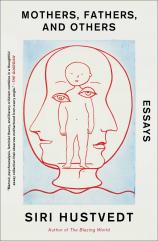Mothers, Fathers, and Others: Essays
Review
Mothers, Fathers, and Others: Essays
As Siri Hustvedt notes in one of the essays collected in MOTHERS, FATHERS, AND OTHERS, critics have frequently (and, she contends, erroneously) jumped to the conclusion that her numerous novels are highly autobiographical in nature. However, in this latest collection of essays, Hustvedt does get personal, verging on memoir at times, especially in the handful of essays that open the volume.
Perhaps the most powerful of these is “A Walk with My Mother,” an extended eulogy of sorts to Hustvedt’s Norwegian immigrant mother, who died near the end of 2019. Here, she movingly outlines the changing relationships she had with both of her parents --- relationships that were fulfilling but also complicated, and that evolved continually over the decades. Hustvedt also writes touchingly about her paternal grandmother, Tillie, in the essay that opens the volume, reminiscing with humorous details about the woman who both shocked and fascinated her and her sisters.
"Considering the intellectual vigor with which Hustvedt approaches most of her writing, it’s refreshing to catch these glimpses into her childhood and family dynamics."
Considering the intellectual vigor with which Hustvedt approaches most of her writing, it’s refreshing to catch these glimpses into her childhood and family dynamics. That’s not to say that these more memoir-like pieces are lacking in rigor, as she grapples with issues of death, remembrance, ritual and parenthood. But readers who come to Hustvedt’s writing for her more academic considerations of neuroscience, philosophy, visual art and literary theory will also find much to appreciate here, including a long piece about the artist Louise Bourgeois (whose self-portrait is featured on the book’s cover art) and the novels of Jane Austen, as well as extended considerations of the role and responsibilities of the literary translator.
Elsewhere, Hustvedt traces the philosophical and (spurious) scientific origins of misogyny, and --- in an essay that perhaps most successfully bridges the personal and the philosophical --- explores the role of mentorship. She acknowledges that she never truly benefited from a mentor, nor has she had the sustained opportunity to serve in that role for others. She also bristles more than a little at the critics’ (again erroneous) assumption that she --- and, by extension, her work --- has been mentored or influenced by her husband, the novelist Paul Auster. In “States of Mind,” as well as in other essays throughout this volume, Hustvedt is concerned with boundaries and borders --- between mind and body, between self and other, and between the individual and the world around them.
Perhaps the least successful essays --- or at least the ones that already seem dated, even though they were published just last year --- are two that were written during the early days of the COVID-19 pandemic. They aren’t bad, or even particularly unsuccessful; they just stick out as being relics of another time, in contrast with Hustvedt’s other, more enduringly relevant works.
Reviewed by Norah Piehl on December 17, 2021
Mothers, Fathers, and Others: Essays
- Publication Date: November 8, 2022
- Genres: Essays, Nonfiction
- Paperback: 304 pages
- Publisher: Simon & Schuster
- ISBN-10: 1982176407
- ISBN-13: 9781982176402




